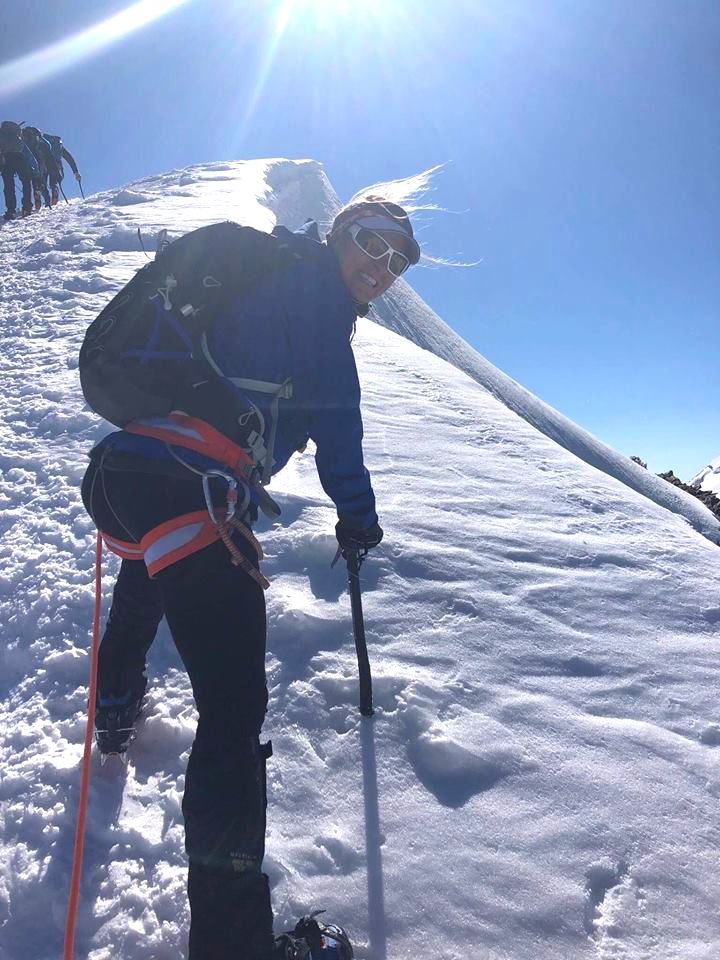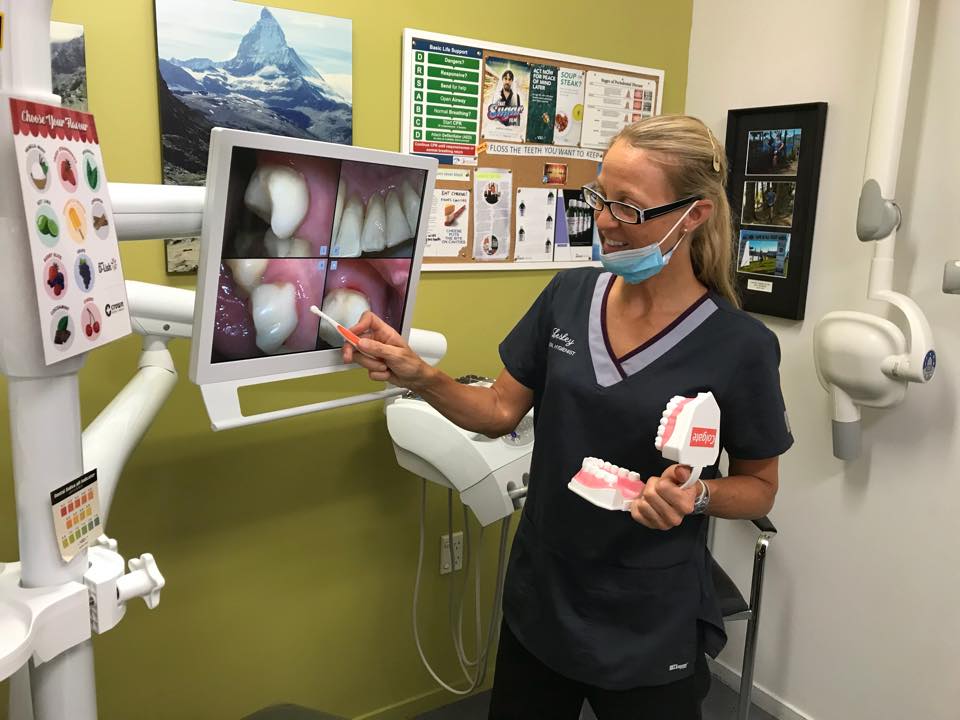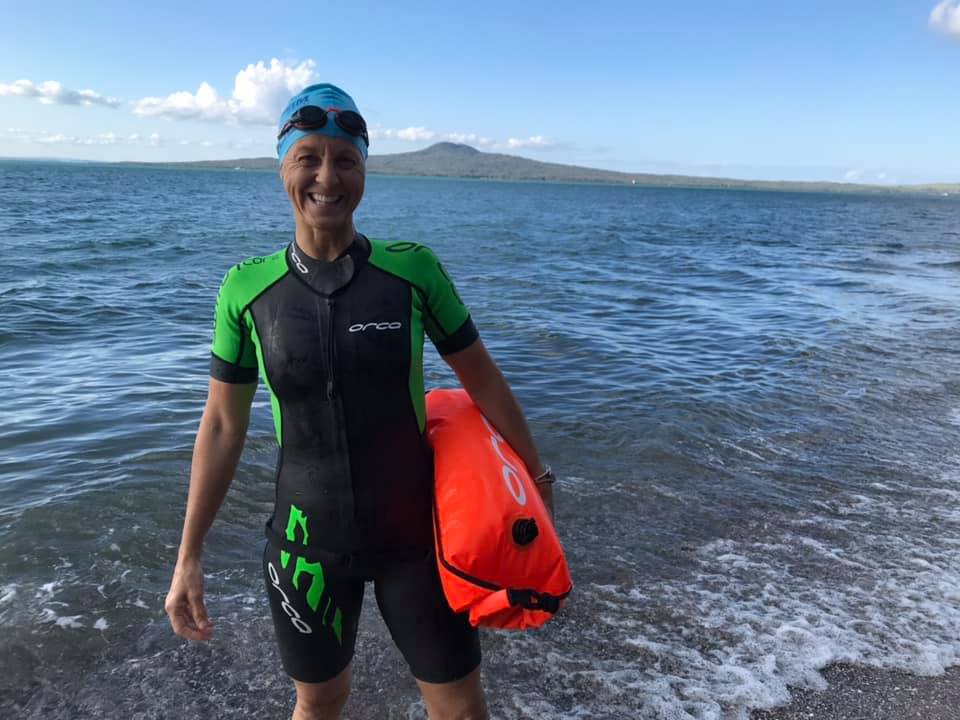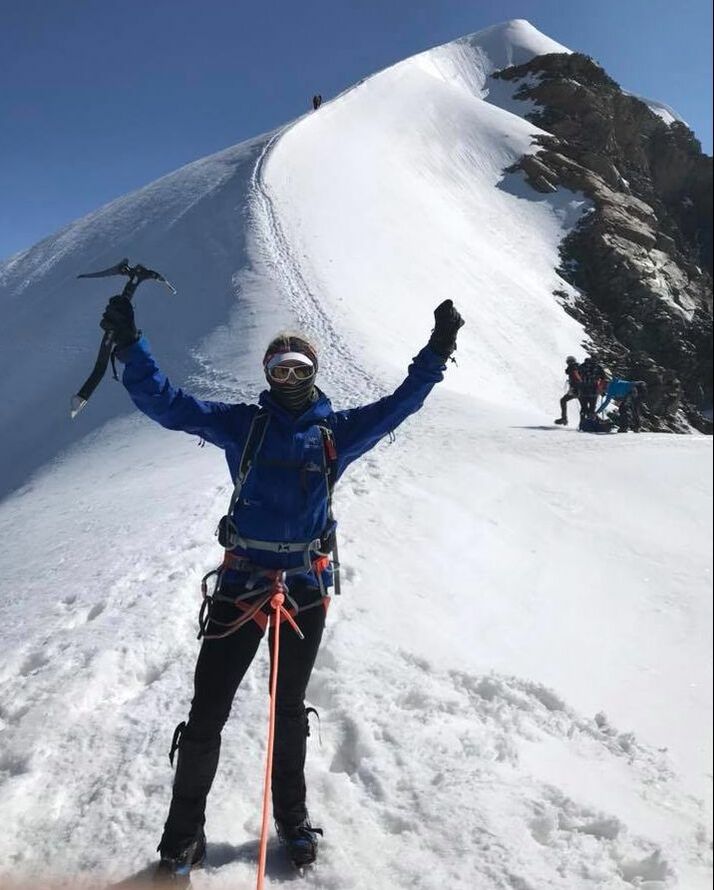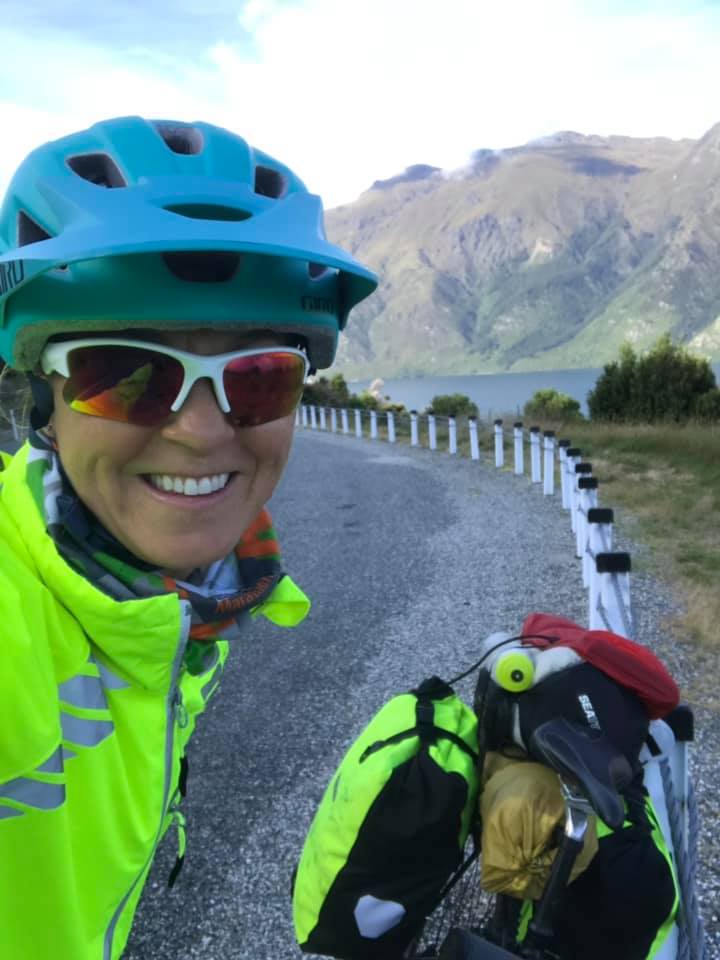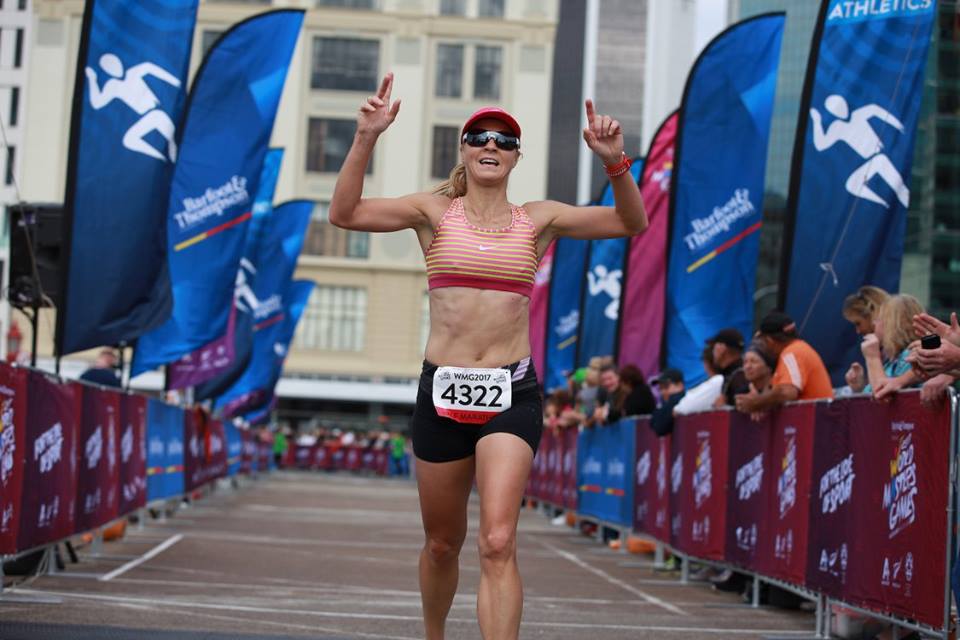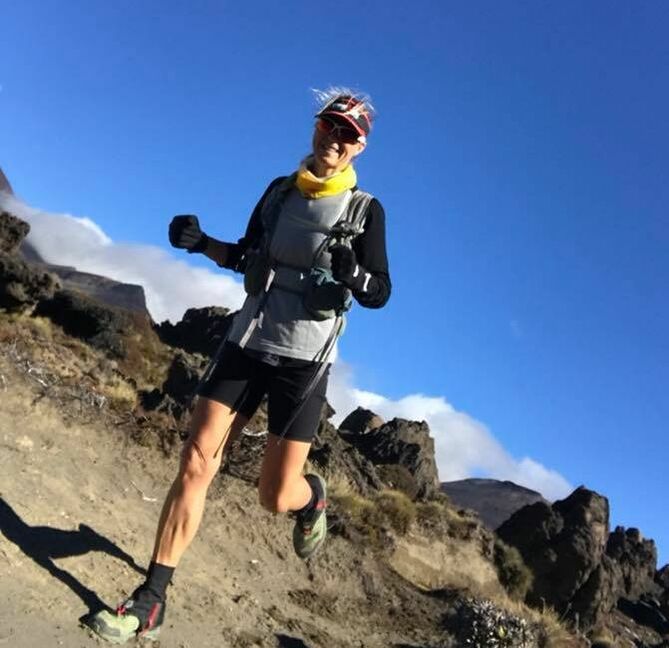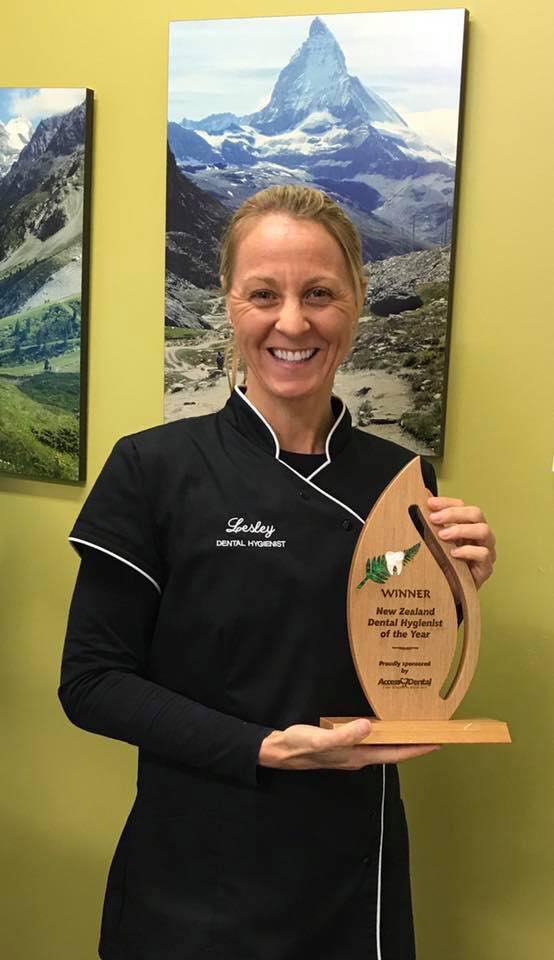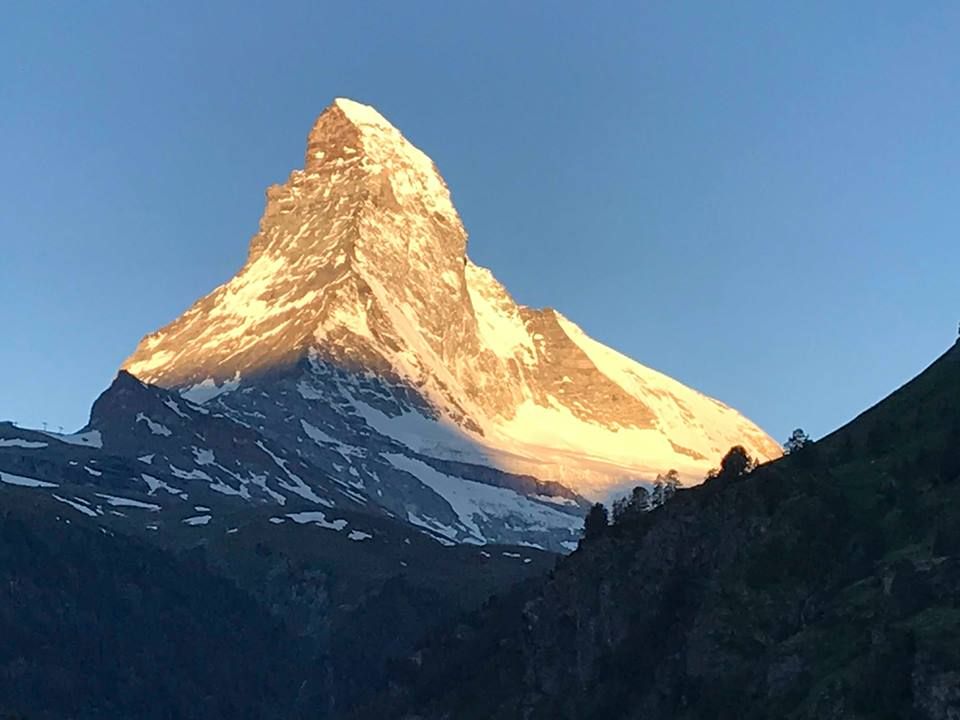|
Lesley Turner Hall in the Swiss Alps. Summiting Mt Pollux at 4092 metres. In Samoa, there is a challenge that only a few people can meet. The Giant Warrior Challenge involves four multi-day events in eight days, Saturday to Saturday. It is not for the faint-hearted and only four have done it. All are men. The first Challenge in 2014 was called the Big Warrior but minus the Half Marathon at the end. Three brave souls took it on and completed the challenge - two Samoans, Samasoni Nimarota and Sini from the village of Saoluafata. The other was a fine Aussie bloke from Canberra named Scott Kristiansen. Then in 2017, the Half Marathon was added and the challenge moved from Big Warrior to Giant Warrior. The notion of Giant goes with the history of Samoa where in years ancient it was inhabited by Giants. Only one man has become the Giant Warrior. His name is Vince Sesto from Victoria, Australia. He is our first Warrior Giant, a man unsurpassed in achievement in Samoa. This year, a lone female has stepped forward to meet the Warrior Challenge to stand alongside Sesto in stature. She is Lesley Turner Hall (LTH) of Auckland, a proud Canadian who has been living in New Zealand for the last 18 years. She lives a full action-packed life. During the week Lesley works full time as a Senior Registered Dental Hygienist in Queen Street and on weekends she is running, swimming, cycling and climbing somewhere in the Kiwi outdoors. We have decided to reprint this interview Lesley did with the Finnish Dental Hygiene journal "Suuhygienisti-Journal" (SHJ) as it paints a good picture of our first Female Giant Warrior entrant both as a professional working woman and an enduring athlete. The interview in the "Suuhygienisti" was translated into Finnish for the Journal, this is the English extract. The Giant Warrior Schedule 2019 Saturday 27 July, Warrior Race Half Ironman (2 km swim, 90 km bike, Half Marathon run) Monday 29 July, Pacific Open Water Challenge 10 km ocean swim Tuesday 30 July, Pacific Open Water Challenge 5 km ocean swim Thursday 1 August, Samoa Swim Series 4 km ocean swim Friday 2 August, Samoa Swim Series II, 4 km ocean swim Saturday 3 August, two Events Le Lava Half Marathon in the morning, Samoa Swim Series III, 4 km ocean swim SHJ. How did you get to be a dental hygienist in New Zealand? What path guided you to become a dental hygienist? How did you end up in your current job? LTH. Right from being a little girl at the age of 6, I knew I wanted to be a dental hygienist. The first time I personally visited a dental hygienist, she had disclosed the plaque on my teeth and even at the age of 6, I was mortified to see 'red' teeth looking back at me (signifying plaque-covered teeth). She then kindly showed me how to brush my teeth properly and at that early age, I was flossing daily and brushing my teeth like an obsessive-compulsive person. I never wanted to see 'red' teeth ever again. It was from that day forward that I became very passionate about teeth and oral health in general. Going into the dental field was definitely my calling. Once I became a dental hygienist, I knew I wanted to take my skills and passion to another country other than my home country of Canada. New Zealand was a good choice as it was not only an English speaking country, but it was also a country that was going to provide me with the great outdoors and a playground for me to play in. I love being in the outdoors, hiking in the mountains is one of my greatest passions next to my passion for creating healthy mouths. Once I decided I wanted to live and work outside of Canada, I sent out my CV to over 100 dental offices in NZ and also put an advertisement in the New Zealand Dental Association website with the title, "Canadian Dental Hygienist for Hire.". My current boss at Queen Street Street Dental had seen my advertisement and liked the fact that I was the Golden Scaler recipient when I graduated at the top of my class from Niagara College in Ontario Canada and that I had four years experience working in a periodontal speciality practice. 18 years on, and I'm still working for Queen Street Dental in downtown Auckland. SHJ. How would you describe your current job, and how would you compare it to some previous job you might have had in the past? Is there some special organization of tasks that you might have seen organized differently in different places? LTH. I work full-time (4.5 days a week), in a very busy and progressive modern general dentist practice. Our clients range in age from young to old and of different financial backgrounds. Many clients, however, are people who work in the central business district comprised of lawyers, bankers, university professors, chiropractors and other medical professionals. Many of which are highly motivated people who value both their oral and physical health. Dealing with a motivated population like this does make my job both easier and rewarding. When I had started at my current practice in Auckland all those years ago back in 2001, dental hygienists were still a fairly new profession in New Zealand and so I was given a lot of autonomy and freedom to practice the way I was taught in school and with the skills and treatment planning knowledge I gained by working in the Periodontal office in Canada. I was given ample time to treat each patient and had new instruments to work with. This allowed me to provide good quality care for my patients and soon I had a very loyal clientele that returned for their 3 to 4 or 6 monthly visits. And eighteen years on, I still have a full book and rarely have no-shows or cancellations. Testament to the value my clients' place on their oral health and the oral hygiene treatment care they receive from me. Creating my own Facebook page called "Lesley Dental Hygienist" and being on the Executive Board and branch level of my professional association for the past 13 years has allowed me to contribute and implement positive changes to the profession of dental hygiene in New Zealand. It has also given me the opportunity to be a great mentor to younger dental hygienists and to be a source of inspiration and knowledge to my colleagues and to the greater public including my own patients. At work in Queen Street, Auckland for Queen Street Dental. Lesley has a full book of appointments everyday. She is loved by her patients and she has not had one sick day in 18 years of work. Lesley also sits on the Executive Board of the NZ Dental Hygienists' Association. SHJ. Are there any key points that you might have learnt along the way compared when you got started as a dental hygienist, and where you are in your career right now? LTH. After 20 years in the industry, the key point I have learned is that "life happens between visits". Patients may have left their appointment with me with the best intentions of implementing all the good oral hygiene tips and skills I showed them then things change in their lives, whether it be they have children and a busy family life, they have sick elderly parents that they have to care for or they start a new job or get a divorce. There is always something that pops up in one's life that seems to affect people's ability to care for their teeth as well as they would like to. I also noticed that ageing does play a big factor in a person's ability to keep their mouth free of plaque. Partly due to their eyesight failing and or their manual dexterity deteriorates or other health ailments affect them. From my experience, elderly people on a whole, seem to struggle with keeping their mouths 100% healthy. SHJ. What is the best part about your job? LTH. I love the interactions I have with my patients of all ages. I really enjoy connecting with them on their level and gaining their trust. It is very rewarding to see my passion for oral health rub off on my patients. I am proud of the people skills that I have and can relate to people of all ages. I enjoy the stories I get to hear about my patients' lives and I learn so much about the rest of the world through them and our conversations. SHJ. Are there some parts about being a dental hygienist you would like to see get improved? LTH. I would like to see dental hygienists being able to work independently from dentists so that we can reach the wider public. It would be great to see more dental hygienists working in retirement and rest homes. Access to patients who cannot physically go to a private practice or clinic would be improved if we could go directly to them instead of them having to come to us. I'd like to see dental hygienists working in schools more and actually scaling/cleaning children's teeth and giving them oral hygiene instruction at the school level. L-R, Ocean swim in Auckland, Cycling the South Island, on the peak of Mt Pollux near the Matterhorn in the Swiss Alps, completing the Half Marathon at the World Masters in Auckland - 2017. SHJ. What are the best parts about living and working in where you do, in beautiful New Zealand? LTH. The best part of working and living in New Zealand is the people are fairly laid-back and easy going. They work hard, but they also appreciate that people need time away from work to re-charge their batteries and experience life outside of work. Every employee by law gets 4-weeks annual leave and are often allowed to take extra unpaid leave. It is a country full of stunning locations with mountains, volcanoes, rainforests and pristine beaches surrounding the entire two islands. It's an outdoor nature-lovers playground. I live in Auckland where the weather is mild and rarely below 10 degrees Celsius in winter. I can run, bike and swim all year round which is great for both my physical and mental health. SHJ. How did you end up running marathons, ultramarathons, doing mountain climbing, and how long have you been doing them? LTH. When I first arrived in NZ back in 2001, I was 29 years old and started taking up running every day. With a climate that allows you to run daily without it being too cold in winter and not overly hot in summer, it made perfect sense to take up running. I then discovered all these running races that are all around the country all year long. My first marathon was the Auckland marathon which I ran 12 months after arriving in the country and you are either that type of person who only ever runs one marathon their whole lives or you are someone who will run a 100 marathons. Eventually, I became very good at marathons and started competing and winning races more. Then I got into the long-distance races like Ironman triathlons and 60-100km ultramarathons. Even winning my first 100km ultramarathon at the age of 45. The trail running community in NZ is very large and is like one big family. The people are very friendly and inclusive of all types of runners, fast and slow, fat or skinny. Belonging to such a great community exposes you to more races and becomes very addictive. Feeling happy and achieving your goals at the end of a race is a great feeling that you want to repeat over and over again. SHJ. How did you become such an outstanding athlete? LTH. I have always loved sport and exercise. Back in Canada, I was on a competitive women's ice hockey team from the age of 9 to 16. And I played competitive club volleyball and varsity volleyball from the age of 14 to 23. Training many hours a day became normal to me and something I have carried with me all throughout my adult life. And now instead of team sports, I do individual sports with running, cycling and swimming, but with the same passion and intensity that I have always put into my training. And with constant training and dedication, one becomes a very successful athlete. Lesley celebrating her 46th birthday with a 46km run around the volcanoes in Tongariro National Park, NZ, April 2018 SHJ. How do you train for climbing mountains? What is the driving force behind it? What are you thinking when you're pushing for 'the extra mile'? LTH. The best way to train for climbing mountains is firstly to be fit. And I stay fit by my daily training regime of running, cycling and swimming and also boxing fitness classes. And secondly, you have to get into the mountains. Hiking with a 15-20kg backpack in the mountains on trails gets you very fit and gets you familiar with climbing rocky and steep terrain and crossing rivers. Having an internal passion for adventure and getting more and more familiar with mountainous terrain helps you conquer bigger mountains and hike longer trails. For me the way I push my body that extra mile is I love to conquer my goals. I have never had to pull out of a race and my sheer determination always gets me to the finish line. SHJ. Do you have other hobbies that are completely different from the ultramarathons for example? LTH. Yes, I absolutely love to read books. I mostly enjoy reading autobiographies and health/self-help books but I also love a good fiction book every now and again. I also love going to the cinema to watch movies, foreign films or films based on true stories being my favourite. SHJ. What ideology you might have for sports, wellbeing, nutrition, diet, relaxation, and is there some special path that made you think that way? LTH. I have always loved being fit and truly enjoy exercise and pushing my body to its limit. I love to sweat and push my body. I enjoy many sports and doing my best to excel at them. I have always trained very hard and gave it my 100% in volleyball practice. Having that type of self-discipline early on in life had set me up very well for the discipline required to train for a marathon and ultramarathons and Ironman triathlons. I am also extremely passionate about fuelling my body with the best nutrition and for me, that means eating a plant-based diet. I also like to feed my mind with positive thinking and self-help books. Perhaps, watching my father die of cancer at an early age made me even more driven to live a healthy and fulfilled life. SHJ. Do you have tips for others how to get started improving their wellbeing, capacity to do sports, eating the right way? LTH. My advice to people is to just start. Start walking or running short distances each day. Start incorporating healthy food items into their diet. And do their research. Read about the positive effects of eating a plant-based diet. Check out trails or races in your area and sign up for one. If you have a goal, you will train and eat right to get yourself ready for it. Having something to focus on always helps with your motivation to lace up and go for that walk or run and you will think more consciously about the foods you put into your body. Then once you have conquered your first race or walked your first trail, you will come to love that feeling of accomplishment and the endorphin rush that comes with it. And you will want that feeling again.
SHJ. Has extreme sports had value or influence in your professional life as a dental hygienist? LTH. I suppose in a way my extreme sports has had an influence on my professional life as a dental hygienist. Firstly, patients tend to listen to people who walk the talk so to speak. My passion for my fitness, sport and mountain climbing seems to have a really positive effect on my patients and truly inspires them. Passionate people tend to have a great influence on helping others make positive changes in their own lives, sometimes that means I can get patients to floss daily or sometimes it means I help them start into a fitness program or they start running or they improve their diet. I also have really great travel stories and photos that my patients love to hear about and look at. SHJ. People around the world, like in Finland know that the Lord of the Rings movies were filmed in the stunning views of New Zealand. Would you recommend New Zealand for a visit? LTH. MOST DEFINITELY! New Zealand is a great place to visit. There is never a bad day in NZ. Every day is a good day! There is so much beauty to see. Like I mentioned before, there are beaches all over the entire two islands, all of them being rugged, pristine and you feel like you're the only one there. There are mountains, volcanoes and rainforests all within easy reach, you've just got to get here. So bring your raincoat, bring your trekking shoes and go have an adventure. The clean air and beautiful surroundings will not disappoint you. Early morning sunrise on the Mighty Matterhorn. Photo - Lesley Turner Hall, July 2018 SAMOA EVENTS / Jan / 2019 Subscribe Here
0 Comments
Leave a Reply. |
Archives
May 2024
Samoa Swims & Events news
Categories |

